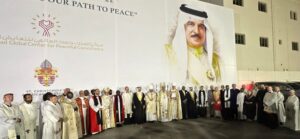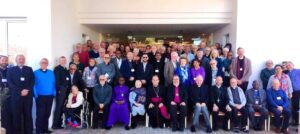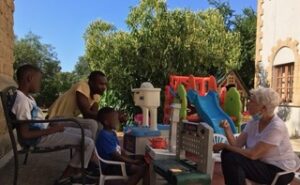Bishop Sean concluded an historic visit to Bahrain with his first Confirmation Service, held at St Christopher’s Cathedral, Manama on 26 May. It was an uplifting ceremony that included parts of the liturgy and hymns in Tamil, with a full congregation celebrating seven confirmands, as well as two young people admitted to Holy Communion. A special sense of family carried through to a bring-and-share supper, with music, singing and dance.
Bishop Sean’s five-day visit to Bahrain centred on his consecration and enthronement on 24 May, with a number of events organised around it touching on issues close to his heart.
On 23 May, the King Hamad Global Centre for Peaceful Coexistence hosted a panel on ‘Healing after Conflict’ in the context of Palestine-Israel, South Sudan and Ukraine. Keynote speaker Archbishop Hosam was joined by Bishop in Europe the Right Reverend Dr Robert Innes, Secretary General of the Anglican Communion the Right Reverend Anthony Poggo, and Primate of the Province of Alexandria the Right Reverend Samy Fawzy Shehata.
The speakers shared deep and personal insight into conflicts in their regions. And yet, there was the common theme of hope. While the concept of healing was, said Archbishop Hosam, in his context “premature”, he stressed that the message of the church in a time of war remained, as in a time of peace, “a call for reconciliation”.
Bahrain is noted for its fundamental commitment to the peaceful coexistence of peoples of different faith. As King Hamad himself has said, “If ignorance is the enemy of peace, then education is the friend of peace”—words Bishop Sean had in mind when he and Archdeacon Michael visited St Christopher’s School where they met a group of students of different faiths and none, to answer some impressively probing questions about their work and the role of the church, including in providing a safe and supportive space for the least fortunate in society.
All over the world, migrants are amongst the most marginalised communities. “Churches often become a surrogate family for migrant Christians, as well as offering a spiritual lifeline,” says Bishop Sean. “That sense of safety, of being part of a family in faith, is what I pray we as a Diocese are able to provide—to those we know, as well as to those who want to know us.”
On 26 May Dean Richard accompanied Bishop Sean and his wife Jenny in a meeting at the Manama offices of the International Organisation for Migration, to discuss a forthcoming IOM programme aimed at better connecting with and resourcing the faith-based organisations that are at the frontline in offering help to migrants in the most troubled circumstances. Bishop Sean later met members of St Christopher’s congregation facing particular challenges. Earlier in the week, he attended the Bahrain launch at St Christopher’s Cathedral of the Bible Society’s Migration Bible, which includes moving stories and reflections on issues related to migration.
Bishop Sean’s visit to Bahrain included a Service of Thanksgiving and Welcome at Awali Church, in the course of which the congregation was invited to ask him questions—an opportunity young members leapt to embrace. There was also a chance for Canon Angela Murray—author of a history of the Diocese—to explain the origins of the East Window (Light of the World), as well as the story behind the cope Bishop Sean was wearing. A beautiful pink damask with stripes of blue Indian silk, the vestment belonged to the third bishop of the Diocese, the Right Reverend John Brown, and was gifted to Bishop Sean by former Archdeacon in the Gulf Canon Alan Hayday, who was given it by Bishop John’s widow, Rosemary. (The photo of Bishop John in his cope hangs in the vestry of St Christopher’s.)
The Diocese of Cyprus and the Gulf is uniquely rich in the cultural mix of its congregations and the geographical reach of its parishes.
“It is,” says Bishop Sean, “a truly modern family. But, like all families, our individual strength and collective well-being depends on us taking care to understand one another and the circumstances we each find ourselves in, supporting and protecting this wonderfully diverse group of Anglican churches.
“The process of developing a uniting and inclusive form of Middle Eastern Anglicanism—one that reflects the demographics of our churches and not limited to one expression of Anglican worship or practice, is,” he says, “a work in progress. I invite all who are part of it to pray for one another as we move forward together in faith.”
Bishop Sean continues his tour of the Diocese with a visit to Doha, beginning on 27 May.
(Click on gallery images below to enlarge)




